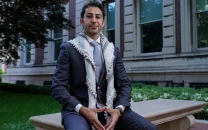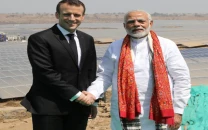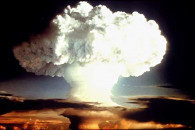Germany conference: Qualms over press freedom in South Asia
Journalists express concern over difficulty of working in South Asia.

At a time when freedom of expression appears to be in jeopardy in South Asia, a gathering of German media men was shocked to learn that atleast six of the 33 journalists killed worldwide this year lost their lives in Pakistan.
Quite unsurprisingly, Pakistan ranks 151 from amongst 179 countries in the World Press Freedom Index’s sample – formulated by Reporters Without Borders (RWB), an organisation operating in around 200 countries.
Seven journaists were killed in Somalia, which stood at 164th in the rankings, while Syria (176th) and Mexico (149th) reported five journalists dead.
Over 165 journalists were put in jails this year, said head of the German section of RWB Matthias Spielkamp, while briefing a group of journalists attending the International Institute of Journalism Summer Academy 2012.
During the briefing, journalists recalled the 2009 episode when American reporter Matthew Rosenberg was accused of being a CIA and Blackwater spy, while having ties with Israeli intelligence in Pakistan, and consequently faced security threats. Wall Street Journal reporter Daniel Pearl, who was kidnapped and killed, was also seen to suffer similar charges in Pakistan.
Spielkamp said that it was worrisome that journalists were falsely accused of being spies in South Asia, particularly in Pakistan, India and Afghanistan. He added that the challenges faced by journalists were largely because of a lack of free press. He said that the RWB tries to protect journalists and ensure their safety wherever they report from.
Being a South Asian journalist, Waheed Ahmed Jalalzada from Afghanistan felt that the worsening law and order situation has put lives of journalists in danger. Unfortunately, the same situation exists in the bordering areas of Pakistan.
Indian reporters face a similar problem. Various separatist groups in Northeast India, particularly in Assam, have created a lot of trouble by forcing journalists to become their mouth piece.
Meha Mathur, an Indian consultant for the Indo-Asian News Service, said she was surprised at the low rank for India (131). “Admittedly, journalists working at grass-roots levels do face considerable risks, but even then, I think our country still enjoys freedom to voice opinion,” she said.
Press freedom is in danger not only near the Afghan border but also in Balochistan, observed the German media men, while recalling the tragic incident involving BBC correspondent Ayub Tareen, in which he was forced to leave Quetta by banned organisation Balochistan Liberation Front.
At this point, the journalists at the meeting questioned if there were any international laws which guaranteed them protection. Article 79(1) of Additional Protocol I of the Third Geneva Convention allows journalists the same protection as other civilians.
Published in The Express Tribune, August 19th, 2012.



















COMMENTS
Comments are moderated and generally will be posted if they are on-topic and not abusive.
For more information, please see our Comments FAQ